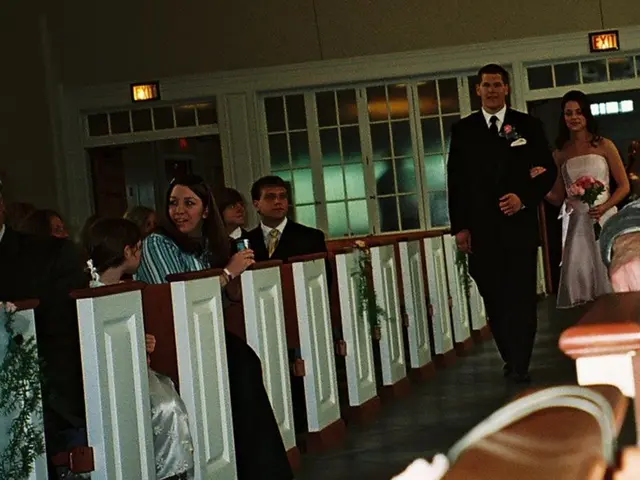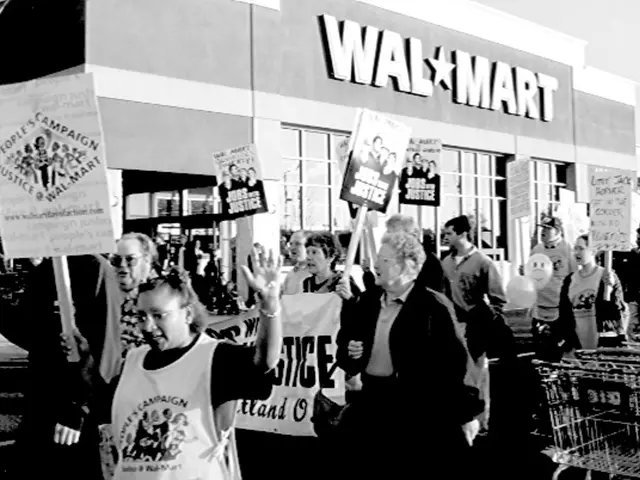World War II Victory Day Celebrations Amid Controversy
Russia denounced as deceptive, France issues war threat caution during WWII remembrance ceremonies in Germany
As the 80th anniversary of World War II's end in Europe approaches, Europeans gather to commemorate this defining moment in history. However, this year's events are not without controversy, as the shadow of Ukraine's ongoing conflict looms over several ceremonies.
The Shadow of Ukraine
The conflict in Ukraine has added a somber tone to certain celebrations, reminding participants of the fragility of peace and the dangers of unchecked aggression. Despite this, many European nations have opted to focus on the Allied victory rather than engaging in heated debates about Ukraine.
President Vladimir Putin will lead Russia's Victory Day parade, a grand spectacle honoring the Soviet Union's role in defeating Nazi Germany. Meanwhile, German President Frank-Walter Steinmeier delivered a poignant speech, praising the sacrifices made by Allied soldiers and resistance fighters while condemning Russia's historical distortions regarding the Ukraine conflict.
Russia has portrayed its actions in Ukraine as a struggle against "neo-Nazis," attempting to justify its actions through narratives rooted in its wartime legacy. However, Steinmeier made it clear that the war in Ukraine is not a continuation of the struggle against fascism, calling out Putin's war of aggression and campaign against a free, democratic country as having nothing to do with World War II.
A Dichotomy of Narratives
The disparity between Russia's and Europe's interpretations of historical events is stark, with many Western observers criticizing Russia for distorting historical facts to justify its actions. Despite this, Russia still maintains diplomatic ties with key allies, as evidenced by China's President Xi Jinping's attendance at the Victory Day celebrations.
As European nations commemorate the Allied victory, they do so with a focus on peace and unity. The UK, for instance, honored the Allied forces through a military parade in London, while France reflected on the resurgence of war and totalitarianism that threatens European peace. Meanwhile, King Charles III led Britain's commemorations, highlighting the importance of remembering the sacrifices made during World War II to secure peace for future generations.
In the end, the 2023 Victory Day commemorations serve as a stark reminder of the complexities of historical narratives and diplomatic relations in a world still plagued by conflict. Russia's celebrations reflect its influence despite ongoing tensions, while European nations honor the Allied victory with a focus on peace and unity. As Steinmeier poignantly asked, "How can we remain free?" The answer remains a question that humanity must continue to grapple with in the years to come.
Enrichment Insights
- Russia's invited China's President Xi Jinping to its Victory Day celebrations, demonstrating diplomatic ties with key allies.
- The conflict in Ukraine has not directly affected European commemorative events but has contributed to a heightened sense of reflection on the importance of peace and the lessons of history.
- Western observers criticize Russia for distorting historical events to justify its current geopolitical actions, such as the conflict in Ukraine.
- European nations, such as the UK and France, have focused on commemorating the Allied victory without aligning with Russia's contemporary political rhetoric.
- The recent commemorations serve as a reminder of the complexities of historical narratives and diplomatic relations in a world still plagued by conflict.
- Russia and China have maintained diplomatic ties, as evidenced by China's President Xi Jinping's attendance at Russia's Victory Day celebrations.
- The conflict in Ukraine has cast a somber tone over certain World War II commemoration events, prompting a reflection on peace and the lessons of history.
- Germany's President Frank-Walter Steinmeier criticized Russia for distorting historical facts about the Ukraine conflict to justify current actions.
- European nations, such as the UK and France, have commemorated the Allied victory separately from Russia's contemporary political rhetoric, focusing on peace and unity.
- The 2023 Victory Day commemorations underscore the complexities of historical narratives and diplomatic relations in a world still marked by ongoing conflicts.







